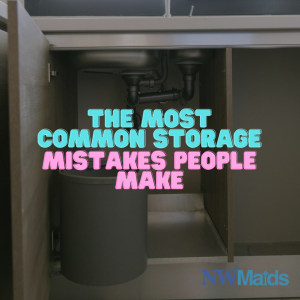
Proper home organization provides benefits beyond aesthetics; it also protects your belongings, extends their lifespan, and makes daily routines easier.
However, many people unknowingly commit common storage mistakes that lead to damaged items, safety hazards, and clutter accumulation.
Recognizing these storage mistakes to avoid can help you maintain a safer, more organized home.
Importance of Proper Storage
Proper storage safeguards your items while keeping them accessible and in good condition.
Improper storage practices like placing heavy items on high shelves or storing chemicals incorrectly can create dangerous situations, financial losses, and added stress.
By learning the most frequent home storage mistakes, you can design an organized, safe living space.
Storage Mistakes Everyone Makes and How to Fix Them
Storing Household Cleaners Under the Sink
Placing all cleaning products under sinks is one of the most common storage mistakes. These areas are prone to heat and moisture, and storing chemicals together can create hazardous fumes if containers leak.
Tip: Keep cleaning products in elevated, dry areas. Separate items by type and never combine bleach with ammonia or other chemicals.
Overcrowding the Refrigerator
Using your refrigerator as extra storage is a common home organization mistake. Overcrowding reduces airflow, leading to uneven cooling, shortened food shelf life, and potential foodborne illness.
Tip: Organize your fridge by food category, use clear containers for smaller items, and place raw meat on the bottom shelf to prevent contamination.
Misusing Bathroom Cabinets
Bathroom cabinets are convenient for storing backup toiletries, cosmetics, and medications. However, frequent temperature changes and humidity can damage products and reduce the effectiveness of medications.
Tip: Store medications in cool, dry cabinets. Keep extra cosmetics in bedroom storage boxes or designated containers.
Ignoring Climate Control in Storage Spaces
Attics, basements, and garages often experience temperature extremes. Electronics, clothing, cardboard boxes, and paper goods can suffer damage without proper climate control.
Tip: Use airtight plastic containers for delicate items and consider climate-controlled storage for valuable belongings. Inspect storage areas for moisture and pests regularly.
Storing Heavy Items on Top Shelves
Putting heavy boxes or objects on high shelves is a frequent storage error that risks injury and property damage.
Tip: Store heavy items on the floor and lighter objects on upper shelves. Invest in durable shelving units for added safety.
Neglecting Labeling
Failing to label storage containers creates confusion and wastes time searching for items.
Tip: Label all containers with contents and storage dates. Color-coded labels help organize seasonal or category-based items.
Storing Food in Unsafe Containers
Using cardboard, paper bags, or non-food-grade plastics for food storage increases the risk of pests, contamination, and spoilage.
Tip: Store food in containers designed for food safety. Glass or BPA-free plastics work well for short- or long-term storage.
Ignoring Expiration Dates
Many people forget to check the expiration dates of stored items, from food to cleaning products. Expired items can be unsafe and lead to financial loss.
Tip: Regularly inspect stored items and discard anything past its expiration date. Follow manufacturer guidelines for safe storage and disposal.
Storing Electronics Improperly
Moisture, dust, and temperature fluctuations can shorten the lifespan of electronics. Storing them in damp attics, basements, or garages causes permanent damage.
Tip: Keep electronics in dry, cool areas. Use anti-static cases and avoid placing heavy items on top of them.
Keeping Sentimental Items Unprotected
Photos, letters, and keepsakes are often stored in unprotected boxes, which accelerates deterioration.
Tip: Use acid-free containers or photo albums, store them away from sunlight and high humidity, and digitally back up essential documents and photos.
Mismanaging Seasonal Items
Holiday decorations, winter clothing, and camping gear are often stored in disorganized bins, making them hard to locate and prone to damage.
Tip: Organize seasonal items by category with stackable bins. Maintain separate storage for each season and track their contents.
Storing Items Too Close to Heat Sources
Keeping storage items near heaters, vents, or radiators can cause damage and increase fire risks.
Tip: Store items away from heat and use fire-safe cabinets for flammable materials.
Overlooking Safety When Storing Chemicals
Household chemicals, including pesticides, paint, and cleaning solutions, can be dangerous if not stored properly.
Tip: Keep chemicals in their original containers, labeled and sealed. Store upright and have a spill kit accessible. Educate household members on chemical safety.
Conclusion: Avoiding Storage Mistakes
While common storage mistakes are widespread, careful planning and proper storage methods can prevent damage, safety hazards, and clutter.
Protect your belongings, maintain home safety, and create an organized living space by avoiding these frequent home storage errors.
For extra help maintaining a clean and organized home, NW Maids offers professional house cleaning services to keep your home fresh, safe, and well-maintained.
Related Posts:
- How to Choose the Best Floor Cleaner for Multi-Surface Homes
- Seasonal Cleaning Habits That Save Money
- How to Maintain a Summer-Ready Patio Clean
- Seasonal Garage Cleaning Tips for a Tidy and Organized Space
← How to Organize Outdoor Spaces Before Winter: Cleaning and Storage Guide


